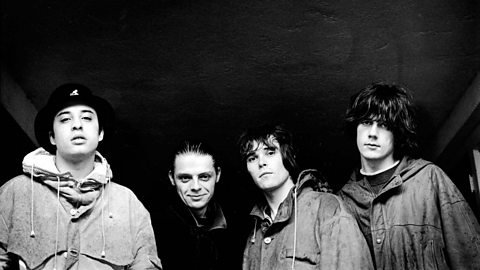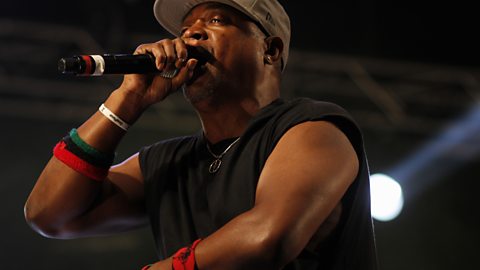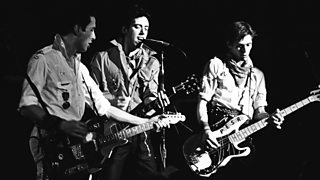The 6 different flavours of an album

By Emily Mackay, 9 October 2018. Updated 10 October 2019
The first long-playing vinyl LP was released in 1948 (Mendelssohn Violin Concerto by Nathan Milstein and the New York Philharmonic Orchestra) and, with that, the album as we know it was born. National Album Day marks this much-loved and enduring format on Saturday 12 October 2019, with 6 Music celebrating with a special series of programmes.
Over 70 years later, musicians are still pushing our most revered musical form forward: with visual albums, playlist albums, albums in constant flux (in the case of Kanye West's The Life Of Pablo) and even . But through all the innovation, the core idea - a themed collection of songs, a statement of the artist at that very moment - still holds strong.
To mark National Album Day, we take a look at all the distinctly different flavours that an album can take – from that all-important debut and tricky follow-up to the curveballs and concept records.
1. The agenda-setting debut
At their very best, debut albums are full of drive, striving to grab attention to kickstart an artist's budding career. It's a lot of pressure, and so those debuts that hit the ground running hold a special place in music fan’s hearts. We’re talking the likes of Kate Bush’s world-building prog-pop gem The Kick Inside, Television’s art-rock pinnacle Marquee Moon, Oasis' dauntless Definitely Maybe and Arctic Monkeys' punchy Whatever People Say I Am, That’s What I’m Not.
Some special debuts, like Massive Attack’s gorgeous trip-hop keystone Blue Lines, or drum and bass maestros Roni Size & Reprazent’s New Forms, define a new genre and usher in a flood of followers. Another such was Erykah Badu's neosoul masterwork Baduizm. : "The fact that Badu, on her debut album created an entirely new namesake genre, tells you from the title that it ain't messing about as a listen."

Erykah Badu dials in
Erykah Badu joins Gilles fresh off the back of her headline show at Field Day.
Some debuts, like The Strokes’ era-defining Is This It, kick off a revival. The album's producer Gordon Raphael told 6 Music's Chris Hawkins in February that 2001 "was a time when guitar music was considered over, and after Is This It came out everybody had leather jackets and carrying guitars in [New York's] East Village, and it was like a little renaissance for rock’n’roll”.
Shortly after, The Streets’ Original Pirate Material and Dizzee Rascal’s Boy In Da Corner helped shape music this side of the pond, taking UK garage and grime to the mainstream. And today, we’re still hearing the effects of The xx’s eponymous 2009 debut, which shifted the course of pop with its powerful, hushed intimacy - paving the way for everyone from Warpaint to Sampha and James Blake.

The Strokes producer Gordon Raphael talks Is This It
The making of The Strokes' classic debut Is This It, according to producer Gordon Raphael
2. The 'difficult' second album
Of course, getting it right the first time only makes the pressure even greater for your follow-up. Many don't manage to match the electricity of their first efforts: take The Strokes’ Room on Fire as an example, which didn't quite replicate the bright, bolt of magic that was their debut. Elastica, meanwhile, took five years to follow what was, at the time, the fastest-selling debut in UK history. Despite its intriguing strengths, 2000’s The Menace lacked the winning punch of its predecessor. The Stone Roses’ Second Coming also took five years to arrive but, despite reaching Number 4 in 1994, the general consensus was that it didn’t quite match the messianic hubris of its title. Writing at the time, it a "jarring anti-climax" that "could have been much, much better".

Stone Roses - Archive Interview (1995)
Steve plays an archive interview from 1995 with The Stone Roses.
Others handled second album syndrome a bit better. Beastie Boys followed up the hype and scandal of their debut Licensed to Ill with the masterly Paul’s Boutique; Joanna Newsom was admired for the delicate alt-folk of her first album, The Milk-Eyed Mender, but stunned fans with the complexity and scale of her second, Ys. Kendrick Lamar’s debut, Section.80, showed his promise, but the game-changing Good Kid, m.a.a.d. City was the record that announced his arrival as rap's new king lyricist. More recently, both James Blake and Wolf Alice earned themselves Mercury Prizes with their second efforts (Blake for Overgrown in 2013 and Wolf Alice for Visions of a Life this year).
Some artists take a couple of turns to really hit their stride though, with their second attempt acting like a commercial quasi-debut: Nirvana’s Nevermind took the rawness of Bleach, added some pop sensibilities and propelled grunge to the global sphere, while Blur's Modern Life is Rubbish broke out of baggy to define the distinctly homegrown sound of Britpop, and Radiohead's The Bends shrugged off the slight alt-rock of Pablo Honey to reveal the Oxford group as one of the UK’s most ambitious and experimental frontrunners.

Hear Wolf Alice's first interview on scooping the Mercury Prize
Matt Everitt speaks to the newly-crowned Mercury winners.
3. The curveball
Having honed your craft with your first few records, it’s all too easy to get stuck in a rut. Extra kudos goes to those great albums bold enough to risk careers by going against the grain. One of the most prominent in this respect is The White Album, as The Beatles rejected commercial concerns with an experimental, eclectic set in which growing tension between the band members was channeled into wild creation.

Paul McCartney, Ringo Starr and Ron Howard chat to ���˿��� Radio 6 Music's Shaun Keaveny
Hear the whole interview that was recorded at the legendary Abbey Road studios
Radiohead's Kid A is in this same vein, seeing Thom Yorke and his band steer away from alienated alt-rock in favour of a deeper dive into electronica. In the hip hop world, Kanye West - then known for his bright, upbeat, soul-sampling production and vibrant, often outlandish lyrics - took a more mournful and minimalist turn on 808s & Heartbreak in 2008, plumbing the depths of his grief after his mother’s death.
In the past decade, we've seen The Horrors defy characterisation as London shock-goths with the krautrock and post-punk influenced kaleidoscopic stunner that was 2009's Primary Colours, while Arctic Monkeys broke their mould with their recent sci-fi suite Tranquility Base Hotel & Casino, a record that initially divided both fans and critics but which is steadily showing its breadth and worth with repeat listens.
Few balls come curvier, though, than Lou Reed's Metal Machine Music, which, released soon after his Top 10 album Sally Can’t Dance, stuck it to stardom, fan expectation and the wants of his record label with an hour of modulated guitar feedback and effects. Reed’s old pal David Bowie, meanwhile, took the last in a long line of tricksy moves with 2016's Blackstar, released on the music icon's 69th birthday and arriving just two days before his passing. It took a much deeper, darker, jazzier path than we’d seen from the star. "Right up until the end, he was pushing to make his most radical work. That is an abiding message for all of us," says Mary Anne Hobbs, who will be playing it in full on National Album Day (available from Saturday 13 October, 7am).

Jarvis Cocker tribute to Lou Reed
Jarvis takes a personal look back over the career of Lou Reed, who passed away recently.
4. The complicated concept album
Albums can be very straight-forward, nothing more complicated than a collection of an artist’s songs to date; not the weighty concept album, though. As popular music gained greater critical kudos as an art form, and more clout as an industry, concept records arose, enshrining the sort of high themes and ambitious structures usually associated with classical music or literature with pop.
Some claim The Beatles' St Pepper’s Lonely Hearts Club Band to be among the first true concept albums: an experimental but unified work with songs threaded along a narrative. The Who’s double-album Tommy solidified the core concept album combo of an overarching theme and an overweening ambition. Then, in the 70s, prog took the trend to grand heights with the likes of Pink Floyd’s The Wall and Genesis’s The Lamb Lies Down on Broadway.

Janelle Monae In Conversation With Gilles
Gilles is joined by US R&B singer, Janelle Monae.
Though the popularity of big-scale, double-LP, rock-operas waned, the concept album never really left rock and pop. Bowie was a master of the form with the likes of The Rise and Fall of Ziggy Stardust and the Spiders from Mars or Diamond Dogs. Kate Bush, too, wove ideas and form together in her work, most famously in 1985's Hounds of Love, which had both brilliant standalone singles and a concept suite about a woman lost at sea. In the 90s, The Smashing Pumpkins brought prog-ish scale and grandiosity to the grunge era with their string-sept and heavy double-album Mellon Collie and the Infinite Sadness, partly inspired by the Fab Four's White Album, and .
More recently, Sufjan Stevens’s Michigan and Illinois albums were initially seen as the first pair of 50 concept albums, each focused on one of the American states (sadly, Stevens later admitted the ambitious project was merely an in-joke). Other 21st century concept albums to spark the listening public's imagination include My Chemical Romance’s emo-rock opera The Black Parade (about the life, death and afterlife of a cancer patient), Kanye West’s My Beautiful Dark Twisted Fantasy (an album-long meditation on fame and misfortune) and Bat for Lashes' The Bride (which tells the tale of a woman left waiting at the altar when her groom is killed in a car crash en route to their wedding). Janelle Monáe can’t seem to resist a concept album, either – her cyborg-inspired Metropolis trilogy culminated in 2013's The Electric Lady, only to be followed by 2018's Dirty Computer, which reflects on modern society's ills channelled into a dystopian world much close to our present.

Bat For Lashes - Interview
Natasha Khan pops in for breakfast with Shaun.
5. The cult classic
Some albums take a while to reveal their true power. As Brian Eno famously said of The Velvet Underground's debut, The Velvet Underground & Nico: "Everyone who bought one of those 30,000 copies started a band."
Many records are not instant critical or commercial hits, but their influence becomes apparent later. For example, Nick Drake wasn’t widely feted at the time he released his three albums Five Leaves Left, Bryter Layter and Pink Moon, but he’s now considered a leading light of English folk. Elsewhere, the debut album by oblique feminist post-punk group The Raincoats had a big influence on riot grrl and grunge two decades later.

Nick Drake producer Joe Boyd speaks to Radcliffe and Maconie
Joe Boyd, Nick Drake's producer, speaks to Radcliffe and Maconie about the cult musician.
An album hailed as foreshadowing punk years before the Sex Pistols or New York Dolls is Black Monk Time, an unforgiving 1966 garage rock LP recorded by The Monks, five American GIs stationed in Cologne. "No one ever came up with a whole album of such dementia," Julian Cope wrote in his 1995 book Krautrocksampler.
6 Music’s Huey Morgan is a big fan of Talk Talk’s Spirit of Eden, another ahead-of-its-time album that has influenced bands like Wild Beasts and These New Puritans. For Huey, its long-term influence relates to the way that "it gives people a chance to look inside their skulls, which is really hard to do nowadays... it's almost as if it's like a very light form of meditation."
Many of these slower burning records are brought to late-blooming fame by crate-diggers. In 2014, lost-classic specialist label Light in the Attic re-released a 1983 private-press album called L’Amour by a mystery man called Lewis. "I just got obsessed with this album," the label’s Matt Sullivan told Stuart Maconie. "It has a David Lynch, Angelo Badalamenti kinda vibe with a little bit of Bob Dylan, Bruce Springsteen's Nebraska, Arthur Russell's World of Echo… so from there started our quest to try to find out who this guy was." Hear the fascinating story behind Lewis' long-lost album, L'Amour, in the clip below.

The story of Lewis' L'Amour: "We’d gone through every scenario of what he’d be like – and this wasn’t one of them”
Matt Sullivan of Light In The Attic Records recalls his quest to find the enigmatic Lewis
6. The forward-thinker
Finally, there's that rarest breed of albums, ones that change the game permanently. So it was with Sgt Pepper’s use of studio manipulation, and the powerful beats, dense samples and uncompromising political rhymes of Public Enemy’s It Takes A Nation of Millions to Hold Us Back. The dynamic hooks of Nirvana’s Nevermind scrapped the terms of engagement for alternative rock bands who’d grown out of the indie underground, putting them on collision course with the mainstream. The Sex Pistols' Never Mind the Bollocks showed how you could neatly package subversion - deconstructing, destroying and reviving rock all in the same album. On Like a Virgin, Madonna embedded media manipulation, personal attitude and scandal permanently into the pop machine.
The influence of some records are less immediately noticeable. Speaking about the ground-breaking nature nature of Talk Talk's Spirit of Eden, Huey Morgan says: "It was self-indulgent and extravagant to be able to take that much time to do something that you couldn't articulate beforehand... Nowadays people can do that stuff on Pro Tools, but back then, I don't think it could have been done if Talk Talk hadn't had those pop hits."

Public Enemy from the ���˿��� archive
Public Enemy talk about their 1988 album 'It Takes A Nation of Millions to Hold Us Back'
Meanwhile, there are records like ...For the Whole World to See by Detroit's Death that appear to foreshadow music's sonic trajectory without actually having a direct impact upon it. This rough-edged proto-punk LP was recorded in 1972, but only released decades later in 2009. Upon its eventual release, it had a massive impact on Jack White, who wrote in the New York Times on the record: "I couldn’t believe what I was hearing... [it was] ahead of punk, and ahead of their time."
It's not just about the music itself, though. Some artists have been known to push the very format of the album itself forward. Radiohead preceded the growth of streaming platforms and free release with their pay-what-you-want model for In Rainbows, while more recently, Björk’s app album Biophilia stretched the definition of what an album could be, and Beyoncé’s Lemonade too pushed artists to stretch the medium further, making a visual album that was about emotion and artistry as much as spectacle.

Björk talks album titles, music consumption and more with Lauren Laverne
The Icelandic singer talks about her Utopian vision, amongst a range of other topics.
These days, the electronic scene has provided an ample space for musicians to explore new sounds. Burial’s longing, sparing Untrue set a template for everyone from fellow producers (Ross From Friends) and avant-garde pop musicians (Grimes) to chart-topping stars (Lorde). Flying Lotus's Cosmogramma sent listeners reeling too, pairing hip hop beats with the cosmic legacy of his great-aunt Alice Coltrane and the jazz dexterity of her husband John Coltrane, creating an album that sounded lightyears ahead of its time.
And it won’t end there, as the album moves into its eighth decade, you can be sure there are artists already operating in its ninth.
Further reading:
Follow us on , on Twitter , or on Instagram .
National Album Day on 6 Music - Saturday 12 October 2019
Other National Album Day highlights include:
-
![]()
The Clash's London Calling at 40
Amy Lamé and Don Letts play out The Clash’s ground-breaking double album London Calling in full - and are joined by Pennie Smith (who took the cover photo) and Clash Road Manager Johnny Green.
-
![]()
Steve Lamacq's Classic Albums - London Calling
The Clash's Mick Jones and Paul Simonon talk to Steve about the making of their seminal Punk album London Calling.
-
![]()
Classic Albums
The stories behind classic long players from the likes of The Rolling Stones, The Small Faces, and The Beach Boys.
-
![]()
Guy Garvey's Finest Hour - The Blue Nile Special - 30 Years of Hats
Elbow frontman Guy Garvey celebrates National Album Day with a tribute to classic album Hats by The Blue Nile.
-
![]()
Pick of the Pops - The Top 40 Best Selling Albums of the 21st Century
Paul Gambaccini counts down the chart, including Robbie Williams, Michael Bublé, Adele and Amy Winehouse.















